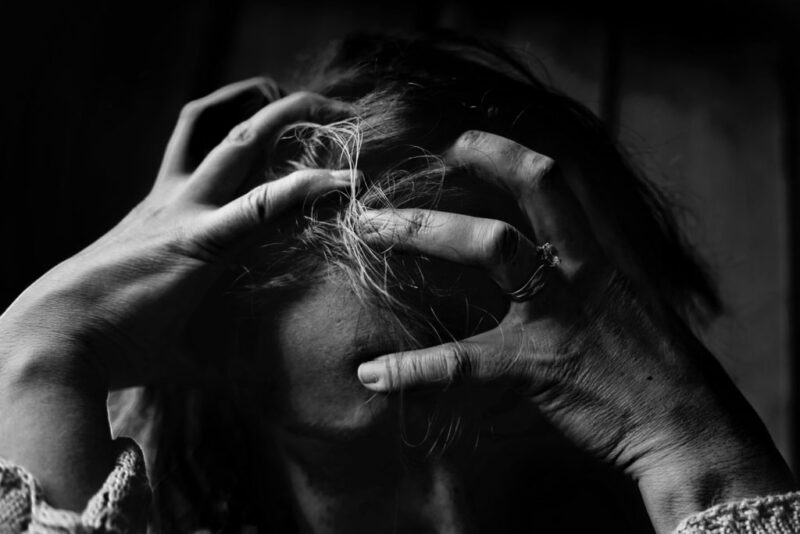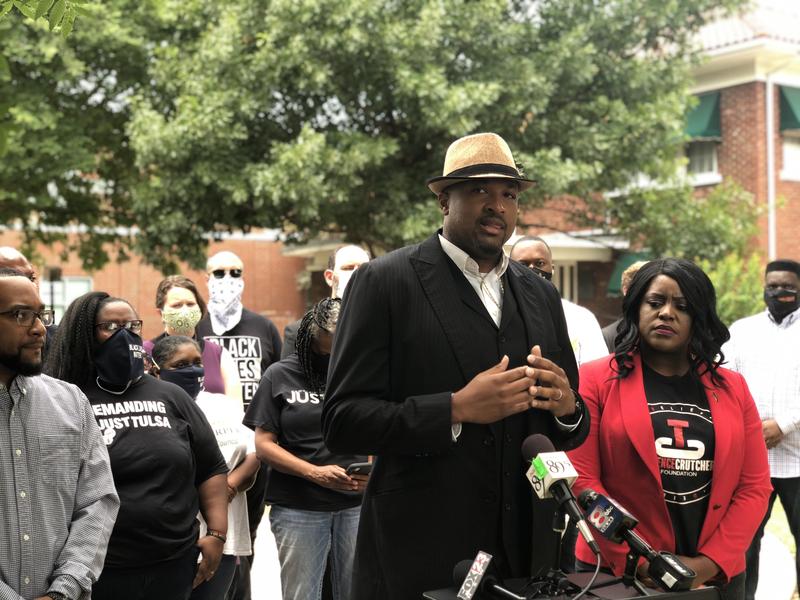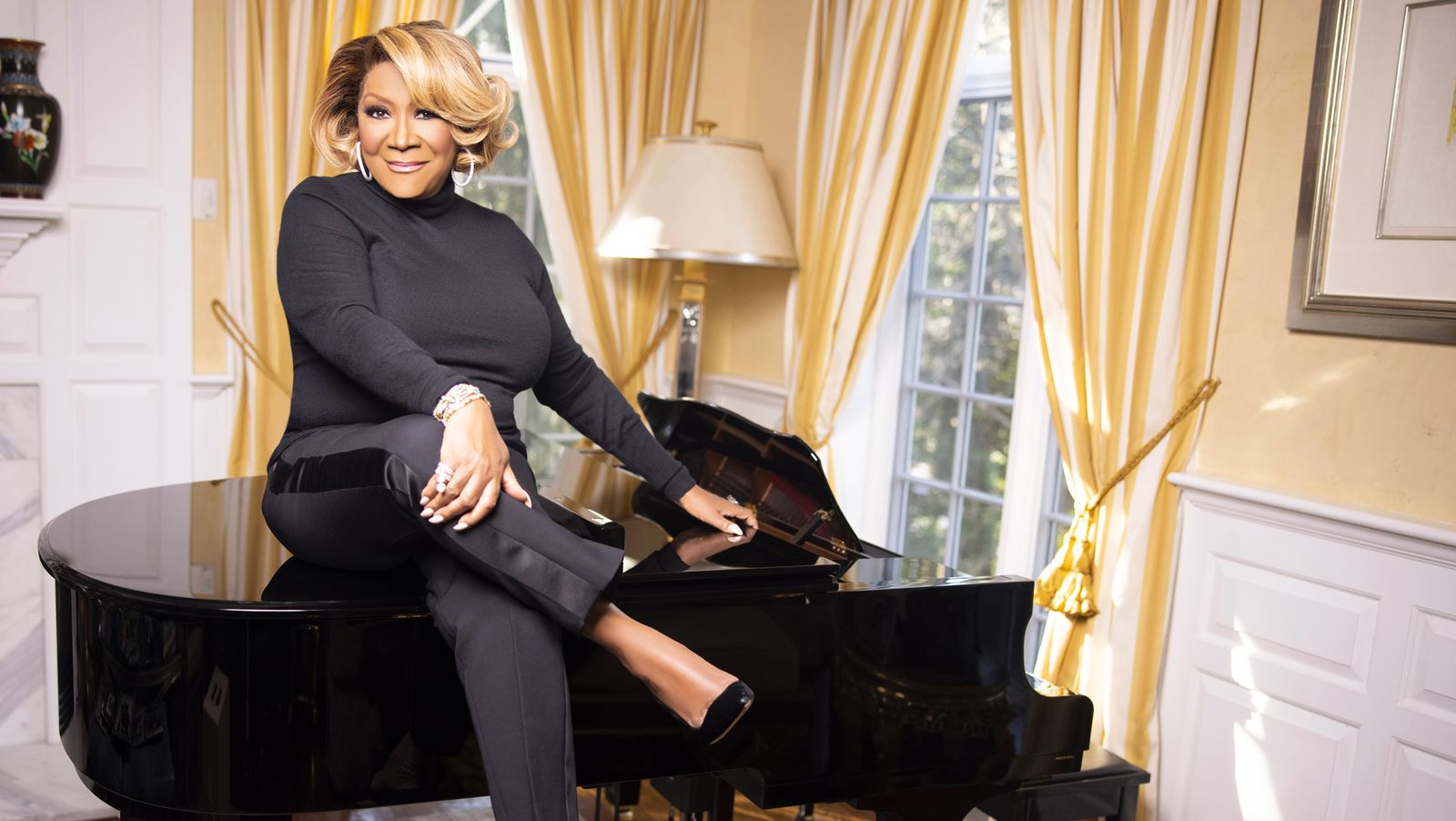
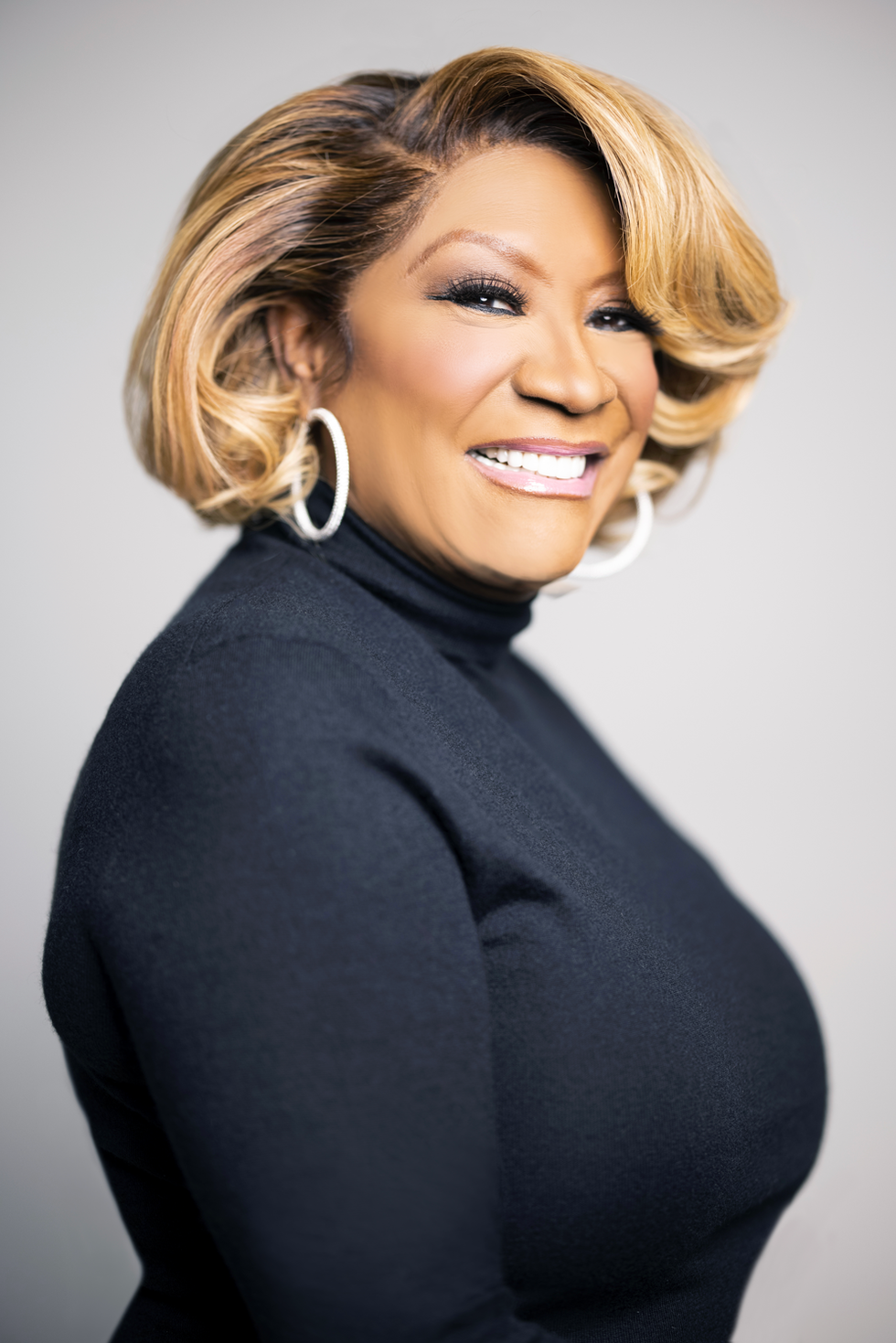
Well, I went to church to sing in the choir, not as a solo performer. But the choir director said, ‘No, Patsy. Patsy, you’re going to…’” Patti LaBelle stops mid-sentence.
We’re talking about great singing, which means we’re talking about church, and the way so many of the singers we revere today—including Patti LaBelle—got their start from a few feet behind a pulpit. LaBelle looks away from the screen of our Zoom call, then down to her floor. “Hey! Cuddles is throwing up! Hey, you guys!” she shrieks to someone nearby in her Pennsylvania home. Her eyes return to the screen: “Hold on, baby,” she coos. “He’s throwing up, my little Shih Tzu.”
Our chat happened on a December evening, and LaBelle is in full glam: thick lashes, immaculate bob, a regal black-and-white blouse fit for a queen. At 76, LaBelle is holding court, currently in the middle of her dozenth career renaissance. Every few years, because she’s glamorous and hilarious and has that voice, “Miss Patti Patti” has a moment. She’s been called, and has dismissed, the title of diva. Her preference: “OG,” she tells me. “Original gangster.”
Last fall, she was a surprising Masked Singer contestant. In September, she and Gladys Knight joined forces for a Verzuz live stream, where two artists “battle” for fans to declare whose catalog is more iconic. The series started during the pandemic with producers Timbaland and Swizz Beatz facing off, and has since expanded to include pairings of other producers and singers. The LaBelle-Knight Verzuz, however, was less a battle, more a loving reunion.
In the last month alone, she covered the New York Times Magazine and performed at the Macy’s Thanksgiving Day Parade. And through the years, the holidays have perennially become LaBelle season: short of her goddaughter, Mariah Carey, no star has so effectively managed to make Thanksgiving, Christmas, and New Year’s their own empire. According to Fox Business, 1,500 Patti LaBelle sweet potato pies were sold by Walmart every hour in November.
But the pies and frozen food empire really come second to her voice. I’m a LaBelle fan, first and foremost, because of her vocal power and ferocity—the way her range kneads her songs, making every one something new. LaBelle’s voice can build a house, only to bring it down a hundred times over, with a dozen different falsettos. But few other “OGs”—or women in music, period—can match her natural candor, the “where are my background singers” or the “what makes you think I can eat the paper, boo”—the all of her.
Improbably for this writer who cannot sing, my first ambition in life was to be Patti LaBelle, the woman shrieking and shimmying in the “When You Talk About Love” music video. I grew up around women who loved Patti LaBelle; as a child I sang “I Like The Way It Feels” into many a hairbrush, with no idea of what I was singing about, but all the sass of someone who did. I tell LaBelle I would listen to her 1997 album Flame in the car on the way to kindergarten before choreographing dances to perform for my confused parents on our den’s fireplace.
“You like Flame?” she asks. “That’s a real, real album. I’m trying to remember the other songs on Flame.”
“‘When You Talk About Love,’” I offer. “‘Love Is Just A Whisper Away,’ ‘Shoe Was On The Other Foot…’”
“Yes, girl. So, you have good taste for a young girl!” And then she asks for my birthday, just to make sure.
“August 9th,” I say.
“You’re a Leo? I’m a Gemini,” she replies, seemingly satisfied.
Just like for the rest of the world, thanks to 2020, this holiday season looks different for LaBelle. She’ll be celebrating in a 13-person bubble: “Because I am an OG, nobody wants to come around me with anything suspect, so we’re not taking chances,” she says of the risks of the coronavirus. Still, she’s cooking for friends outside her circle, who’ll pick up their dinner plates at her front gate. “I said, ‘You can eat, but you can’t come in.’” She’s planning to make a virtual appearance during Anderson Cooper and Andy Cohen’s CNN New Year’s Eve broadcast—but the stricter precautions in place for filming won’t stop her from having a good time. “I’m going to have fun, I’m going to have ‘California Love’ playing, and dance by myself, because I love to dance,” she says.
“California Love” by Tupac Shakur is LaBelle’s favorite song. Just the other day, she says, she required it as hype music for a Walmart photoshoot. If it seems, at face value, incongruous that the voice capable of tenderly pulling two and three and four vocal runs out of the word “if” listens to Tupac and grins at any mention of 50 Cent’s “In Da Club,” it does not seem that way to LaBelle. “People think certain songs are not age-appropriate for a 76-year-old woman,” she says. “‘California Love’ is appropriate for me, and I am 76.”
Sixty of those years have been spent in the entertainment business, which means six decades’ worth of stories. After getting her start in the church, she was the lead singer of Patti LaBelle and the Bluebelles. In the 70s, under simply “LaBelle,” the group released the disco-horny confection “Lady Marmalade.” After LaBelle split up, Patti started her own solo career as a soul singer, and went mainstream in the 80s with “New Attitude.” She considers her most-prized accomplishment being part of the first Black pop group to perform at the Metropolitan Opera house. “Some of our material was sort of operatic, but we’re not opera singers,” she tells me. “We’re just rock-and-roll girls.”
If there’s one thing I’ve missed during the pandemic, it’s mess, so on our Zoom, I’m determined to get LaBelle to dish. Luckily for me, she drops dramatic stories casually, with the timing of a seasoned stand up comic. She knows how funny she can be, but isn’t phased by it. “Who’s your favorite person to cook for?” I ask. She runs down the list: “I’ve cooked for Mick Jagger, I’ve cooked for Arsenio [Hall], I’ve cooked for Richard Pryor. I’ve cooked for Whoopi Goldberg, who hates green vegetables,” she says. And then, after a mischievous pause: “The only thing green she wants is money.”
Speaking of Whoopi, did you know Patti LaBelle was on the shortlist for The Color Purple (1985, starring Goldberg and Oprah) and Ghost (1990, starring Patrick Swayze, Demi Moore, and Goldberg again)? I didn’t either. “What was the story there?” I ask.
“Okay, so, listen, I went to an audition for Ghost, got stuck in the Lincoln Tunnel. When I got there, it was too late, because Whoopi had gotten the part that I was going to read for,” she says. “And then, The Color Purple, I was afraid to play Shug Avery. I was afraid of acting, period. And I talked to Steven Spielberg and said, ‘I just can’t pull off this part.’ I knew I couldn’t. Then again, maybe I could have, but I didn’t give myself the chance.”
Seemingly every major vocalist—Mariah, Whitney, Fantasia, Beyoncé, Mary J., Ariana—has a story about being mentored by LaBelle. But the most important mentor LaBell herself was Nina Simone. LaBelle smiles warmly when reflecting on her own hero, recalling how they would talk on the phone on weekends, Simone in Paris, LaBelle in Philly. She does an impression of Simone’s deep voice: “She’d say, ‘Did you find me a man yet, girl?’ I’d say, ‘No, honey, I can’t find no man for you,’” LaBelle laughs before discussing how tender their relationship was.
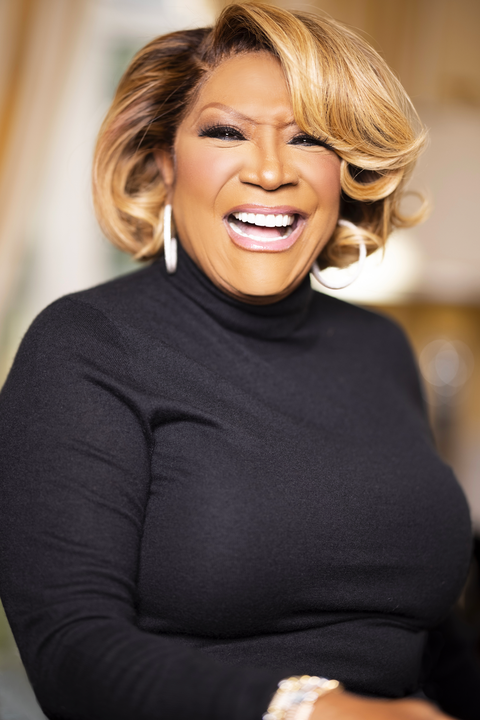
“When she was going through her bad times, she let me see her breast. She said, ‘Nobody can see this,’ because she had them removed. She let me see her head, because her hair was gone. She just felt so comfortable with me,” Labelle recalls of Simone’s battle with breast cancer. But then she perks up at the memory of doing a show at Carnegie Hall, when a handler delivered a paper cup of wine to her dressing room. Simone was incensed. “Honey, she turned that place out! She told me: ‘Don’t you ever drink out of anything except crystal, darling. Just crystal for you, Patti!’ I said, ‘Okay, girl. Take that paper cup back, boo.’ They took the paper cup back and brought me the best glass in the house. Nina said, ‘That’s who you are. You’re a star.’”
She describes a special bond among the OGs, the Black women who sang their way in the 60s and 70s from the chitlin circuit of venues that catered to Black audiences to Carnegie Hall and the Metropolitan Opera House. And the bond still exists in 2020.
A decade or two ago, it seemed there were more opportunities for that type of fellowship, when a half dozen divas were in the same room, all capable of bringing down the house. I remember watching the annual VH1 Divas Live, or Oprah’s Legends Ball gospel brunch, where Dionne Warwick passed the mic to Yolanda Adams, Yolanda Adams passed the mic to Chaka Khan, Chaka Khan passed the mic to Gladys Knight, and on and on, until Patti LaBelle closed out the affair. There was a sense, watching moments like those, that the voices of these icons could carry us forever, a feeling that returned during her Verzuz installment with Knight.
“[Verzuz] was a day that me and Gladys got married. That’s my best friend. It was like we were a real couple of OGs in the house. There’s no competition with me and Gladys,” she explains. “It’s like we’re family. There’s never anything for us to talk negatively about each other. Now, we might talk about somebody behind their back, but I’ll fight anybody who says anything bad about Gladys.”
The music business might be fickle, but her friendships clearly aren’t. “There’s never been ‘You sing better than I’ or ‘I sing better than you,’ and I think that has a lot to deal with getting a good friend in this industry, because it’s always peer pressure. It’s always somebody trying to outdo you. And, with us, we don’t roll like that.”
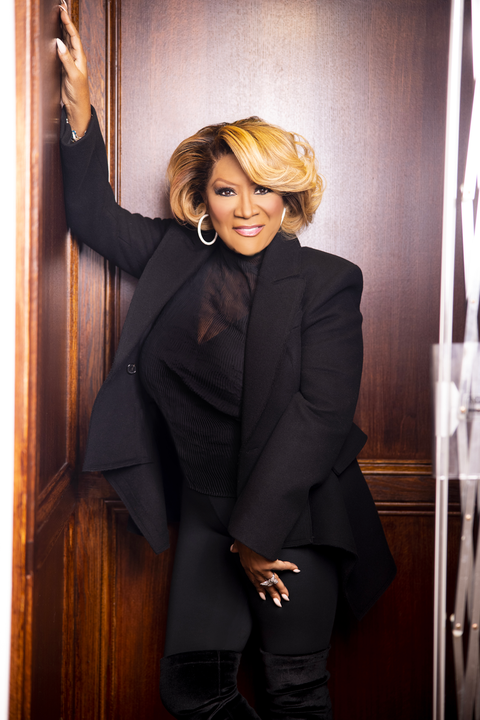
Two weeks before Thanksgiving, Patti LaBelle went viral for none of the reasons you’d expect Patti LaBelle to go viral for ahead of Thanksgiving. Dean Browning, a white Republican congressional candidate, seemingly mistakenly tweeted a missive about being a “Black gay guy” who “can personally say Obama did nothing for me.” As the entire internet was scratching its head, Browning explained that he’d accidentally copied and pasted a message from a supporter. That supporter turned out to be Byl Holte, LaBelle’s nephew and adopted son, who later posted a video defending Browning and the messages they’d exchanged.
I ask LaBelle, who has always publicly supported Obama and performed for him multiple times, how she handles political disagreements with family members, especially over the holidays. “Guess what? I didn’t choose my family. I choose my friends,” she says. “I love Billy. He has a Republican mind. And, guess what? I don’t. But do I hate him for having the mind that he has? No, I can’t.”
A few hours before our Zoom interview, in fact, she says they’d spoken on the phone. “He was saying, ‘I love you and I’m so sorry.’ You give people chances, when sometimes, they don’t even know what they’re doing or why. So I can’t beat him up for the rest of his life. I decided to take the high road with him by letting him know that you make mistakes—but when my name comes in that mistake, that’s a no-no. Certain things happen in life, and I just keep going on, because I love him.”
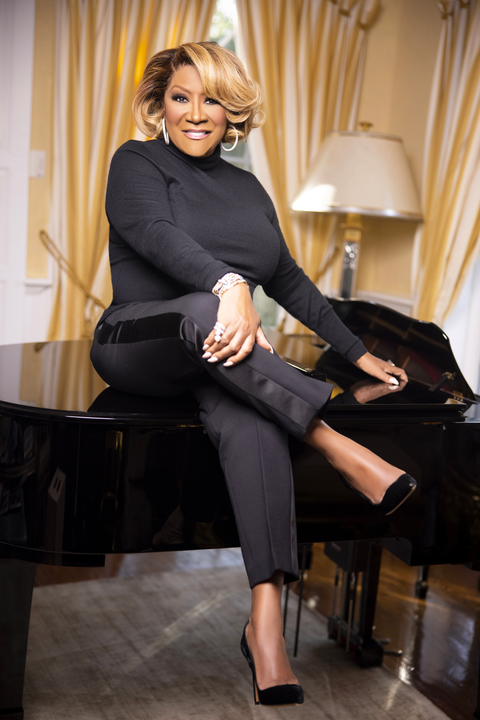
LaBelle’s sympathy can be hard won. For years, she’s described her own flamboyant alter-ego, whom she calls Priscilla. LaBelle insists she’s still around. “She is a mess,” she laughs. “I am a Gemini, I have so many personalities. I never know when she’s going to show up and show out, and a lot of times, she shows out—and then, the next day, I feel bad for the person who had to deal with Priscilla, because she’s a witch with a capital B, and I can’t help it.”
She tells me a story from years ago, when Priscilla pranked her LaBelle bandmates. She made up a radio appearance and told them she was going to dress to the nines for it. “‘Honey, for this radio thing, I know people can’t see me on the radio, but I’m going to get clean. Put on your best drag!’ Everybody got dressed, and when we finished dressing, I said, ‘Sike!’ Well, those heffas wanted to kill me.”
“Why did you do that?” I ask.
“Because I’m bad,” she says simply. “Because I’m a prankster and a gangster.”
For how nimble her always-evolving career has been—the pies, the television, the live shows, the voice, the social media presence that is just shy of Dionne Warwick’s impromptu ethers—the last nine months, for LaBelle, have felt a little listless. Every other endeavor is secondary to being a “throw down sanger.“
Sometimes that voice’s tremble and squeal can out-bill what a mystifying, lavish performer she is. In the 80s, she’d sink to the floor in passion or weep during a ballad. For years, one of her many performance signatures has been kicking her pumps off onstage.
“[It feels] like heaven. You know I got bad corns, okay? So, when your feet are hurting in those five and seven-inch heels, you say, ‘The first chance I get, I’m going to place it somewhere, I’m going to take the shoe off,’’’ she explains.
“I’ve been so blessed with fans who honor what I do, like the fact that I take off my lashes on stage and give them to the front row—take off my long nails, I’ve always had long nails—take the sweat off my forehead…and fling it to the front row.”
And then she sighs. Patti pies, Verzuz battles, Zoom interviews like this one—none are quite the same as her happy place.
“I miss all that, honey. I miss that damn stage.”









